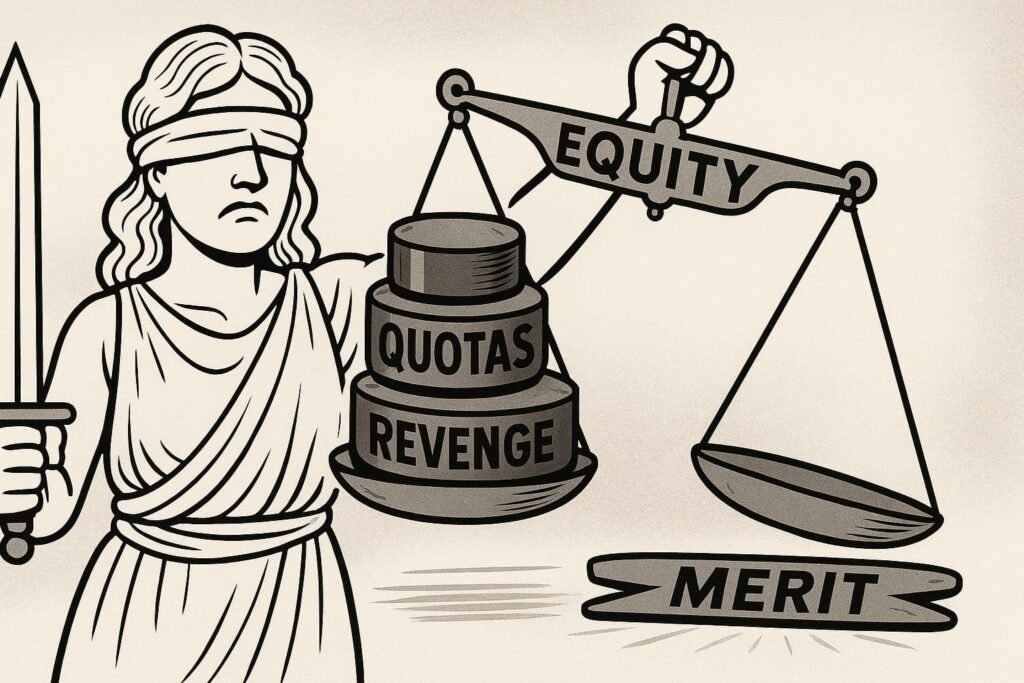Equity Isn’t Justice, It’s Revenge – Opinion
Here’s what no one admits: equity doesn’t mean fairness. It doesn’t even mean equality. Equity is payback dressed up as progress — a politics of revenge disguised as justice.
Once, justice meant blind rules applied to everyone. Equality meant the same opportunities for all. Equity changes the script: it demands equal outcomes, even if the rules have to be bent, standards lowered, or people punished to get there.
The word sounds noble. The reality is corrosive.
From Equality to Equity: A Bait and Switch
Equality was simple: everyone plays by the same rules. Outcomes differ, but that’s life — ability, effort, and luck will always vary.
Equity shifts the goalposts: if outcomes differ, the system must be guilty. The solution? Tilt the scales. Reward some groups, handicap others, and call it fairness.
It’s not fairness. It’s redistribution by identity — and it breeds resentment faster than it fixes inequality.
Justice or Revenge?
Real justice is impartial. It protects the innocent, punishes the guilty, and applies consistent rules.
The new “social justice” looks very different. It treats history as a scorecard and present-day people as debt collectors. Policies like affirmative action aren’t framed as opportunity, but as payback. Those labelled “privileged” are marked for penalties, whether they personally did anything wrong or not.
That’s not justice. That’s revenge with paperwork.
Victimhood as Currency
Equity’s power structure rewards victimhood. The more oppressed you claim to be, the more moral authority you wield. Success is suspect. Struggle is sacred.
The result? A culture where people compete not to achieve, but to demonstrate suffering. Outrage is rewarded. Resilience is punished. Personal responsibility disappears.
This isn’t empowerment — it’s infantilisation.
The Tyranny of Mediocrity
Equity doesn’t lift people up. It drags standards down. In the name of “fairness,” excellence is redefined, quotas replace merit, and ambition is treated as privilege.
The outcome isn’t a flourishing society. It’s a grey one — where sameness is enforced, mediocrity rewarded, and innovation stifled.
A society obsessed with equity doesn’t inspire greatness. It punishes it.
Conclusion: Fairness Without Revenge
Equity promises fairness. What it delivers is bureaucracy, resentment, and division. It replaces opportunity with outcome management, merit with quotas, and justice with retribution.
The irony? In trying to redress the past, it risks repeating history’s worst habit: punishing today’s individuals for yesterday’s sins.
Real justice doesn’t settle scores. It sets standards. Until we remember that, equity will keep selling revenge as fairness — and we’ll keep paying the price.
👉 Cross-links: Equity Explained, DEI Explained, Privilege Explained
👉 For the full picture of how Diversity, Equity, and Inclusion really work, visit our DEI Explainer Hub.
FAQ
What’s the difference between equality and equity?
Equality means equal opportunity and equal rules. Equity means engineered outcomes, even if rules must be tilted.
Why call equity “revenge”?
Because it punishes people based on group identity, not actions, treating present individuals as stand-ins for past wrongs.
How does equity show up in daily life?
Through quotas in hiring and education, biased policies in law and healthcare, and constant identity-based metrics.
Why is equity controversial?
Because it replaces fairness with redistribution, creating new unfairness and fuelling resentment.
Who benefits from equity?
Politicians (virtue points), activists (influence), corporations (cheap branding). Ordinary people bear the costs.



